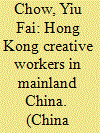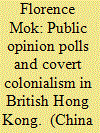| Srl | Item |
| 1 |
ID:
151966


|
|
|
|
|
| Summary/Abstract |
China took up the discourses and agenda of creative industries increasingly in the first post-millennium decade. Amidst the attempt to turn from ‘made in China’ to ‘created in China’, would the translation of the creativity discourse usher in a better society in China? This article serves as one of the probing steps to ascertain what creativity enables and disables in China. I do so in an inquiry that departs from existing scholarship on two aspects. First, it follows a regional, cross-border labour flow. Second, it focuses on the people in the frontline of creative work. My study draws on the experiences of 12 Hong Kong creative workers who moved to Shanghai and Beijing. Their translocal and transcultural encounters allowed me to trace and foreground the particularities of creative practices in China. Like many fellow creative workers, my informants moved north to pursue better career opportunities. But they also wanted to do something more. Some of them managed to do so. At the same time, their stories were punctuated with disappointments, frustrations and continuous adjustments, categorized into what I call the precarious and the ethical. The findings of this inquiry pose questions on the hypothesis, the hype and the hope of creativity in China.
|
|
|
|
|
|
|
|
|
|
|
|
|
|
|
|
| 2 |
ID:
163489


|
|
|
|
|
| Summary/Abstract |
This article examines colonial statecraft and state–society relations in a pivotal period for Hong Kong. Using historical methods and archival evidence, it overcomes the limitations in existing research, which is often theoretically driven and reliant on published sources. The article reveals that the Hong Kong masses were made structurally invisible by the Movement of Opinion Direction (MOOD), a polling exercise introduced by the reformist colonial state. The public were unaware that their views were disseminated to policymakers and that they affected policy formulation: this was covert colonialism. The article investigates confidential MOOD reports generated by the Home Affairs Department from 1975 to 1980, demonstrating why and how the colonial administration constructed public opinion. By disclosing what these secret files reveal about changing public attitudes towards the colonial government, the United Kingdom and the People’s Republic of China (PRC), the article also provides new insights into public receptions of the state’s reforms and potential threats to the colonial regime in the 1970s.
|
|
|
|
|
|
|
|
|
|
|
|
|
|
|
|